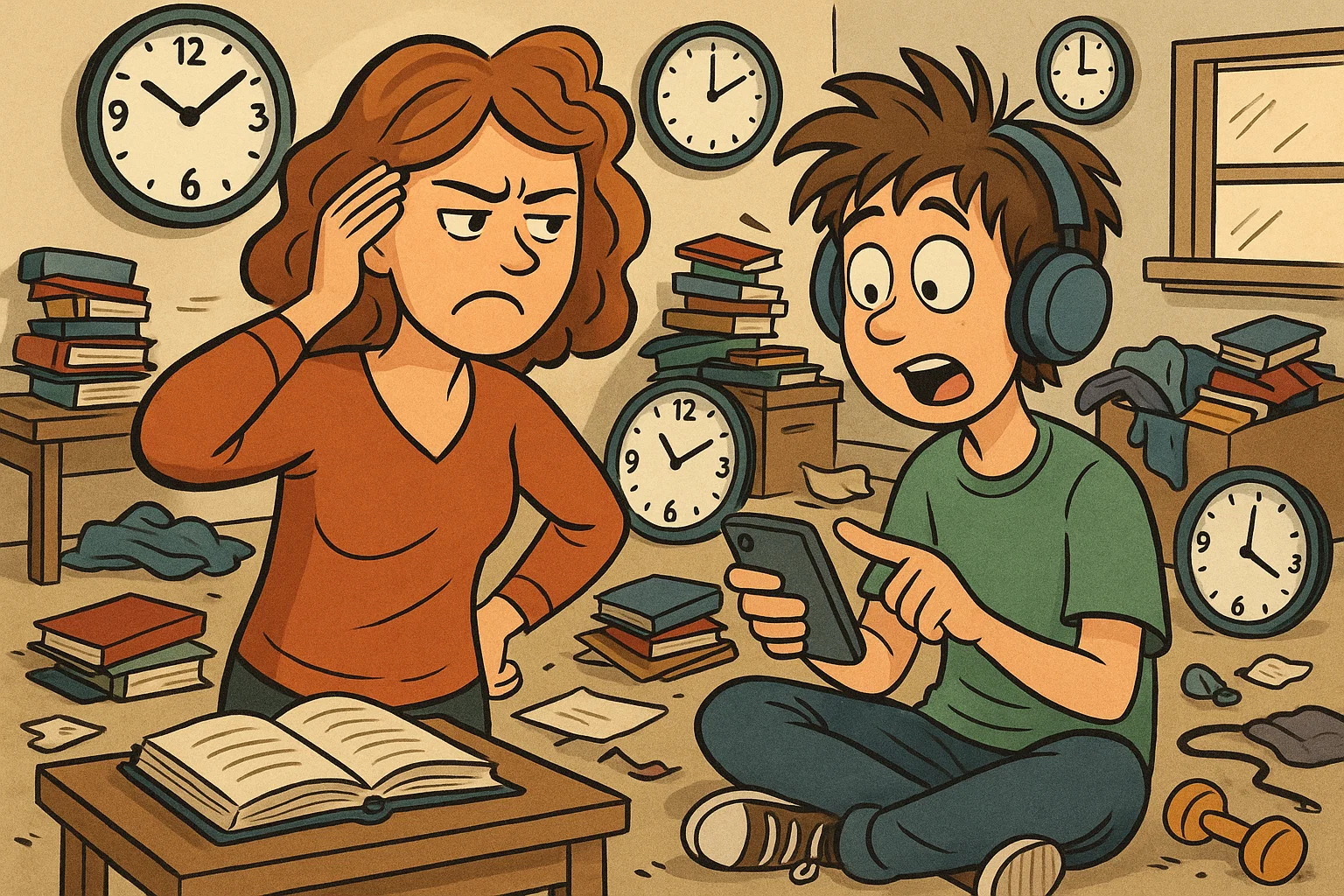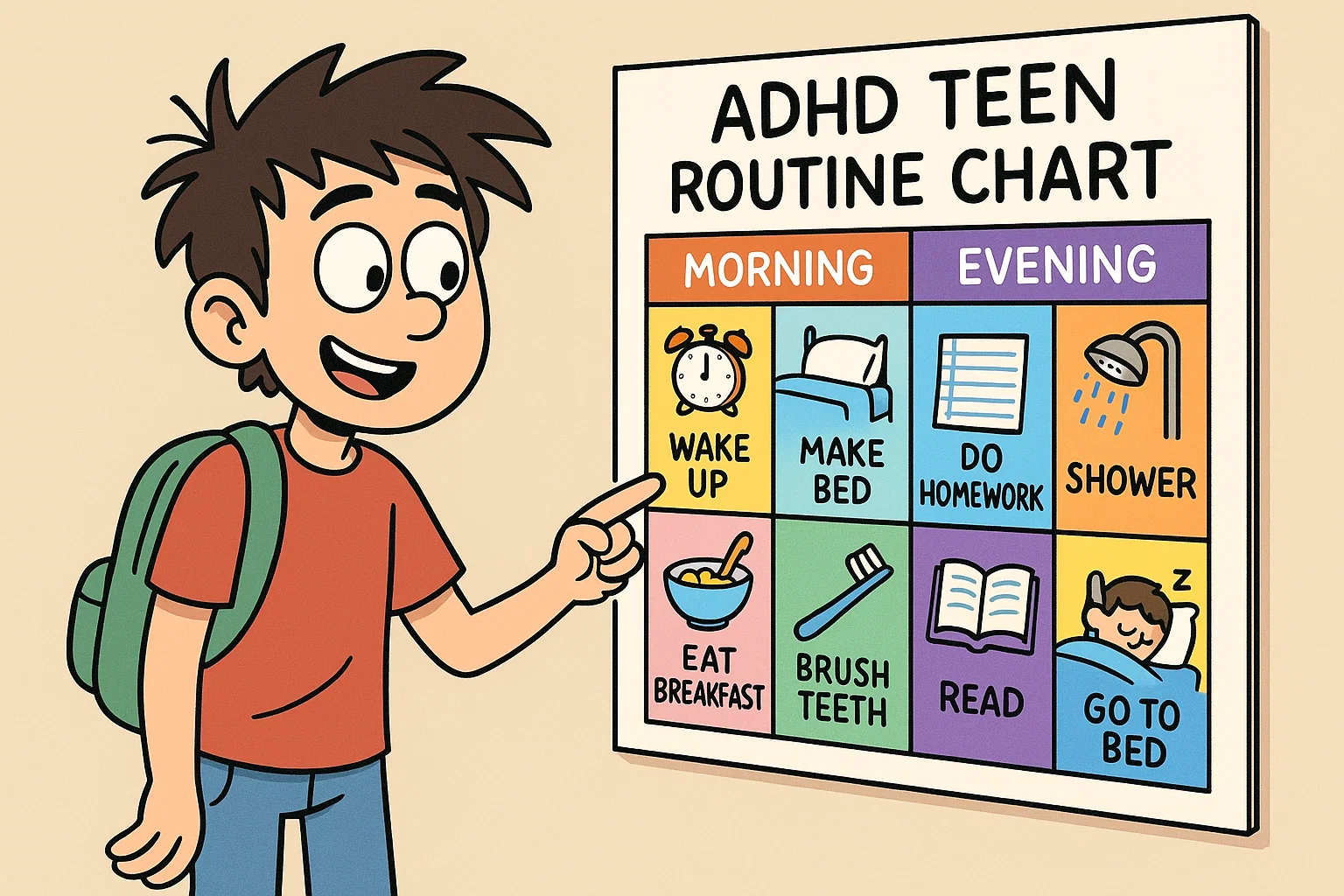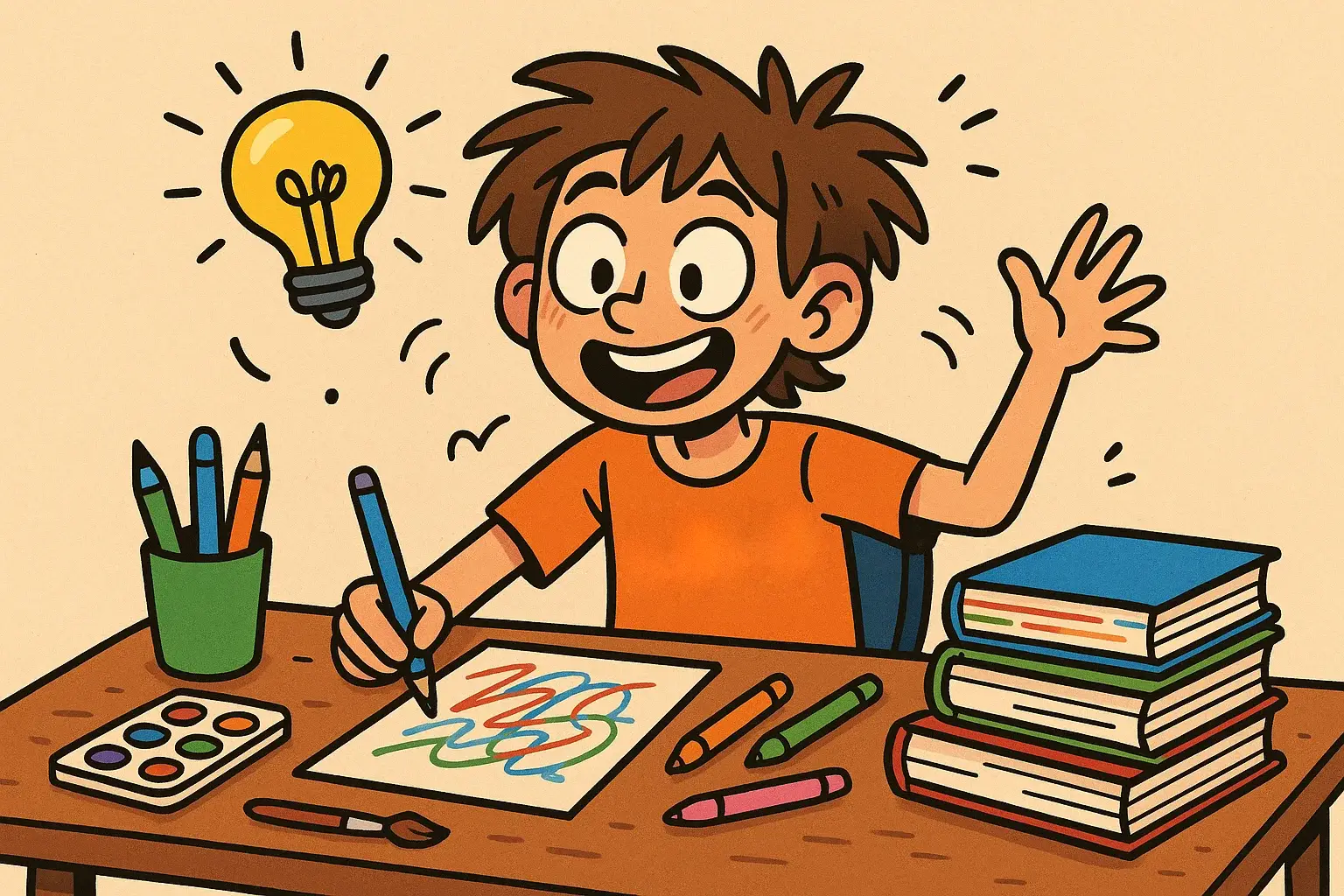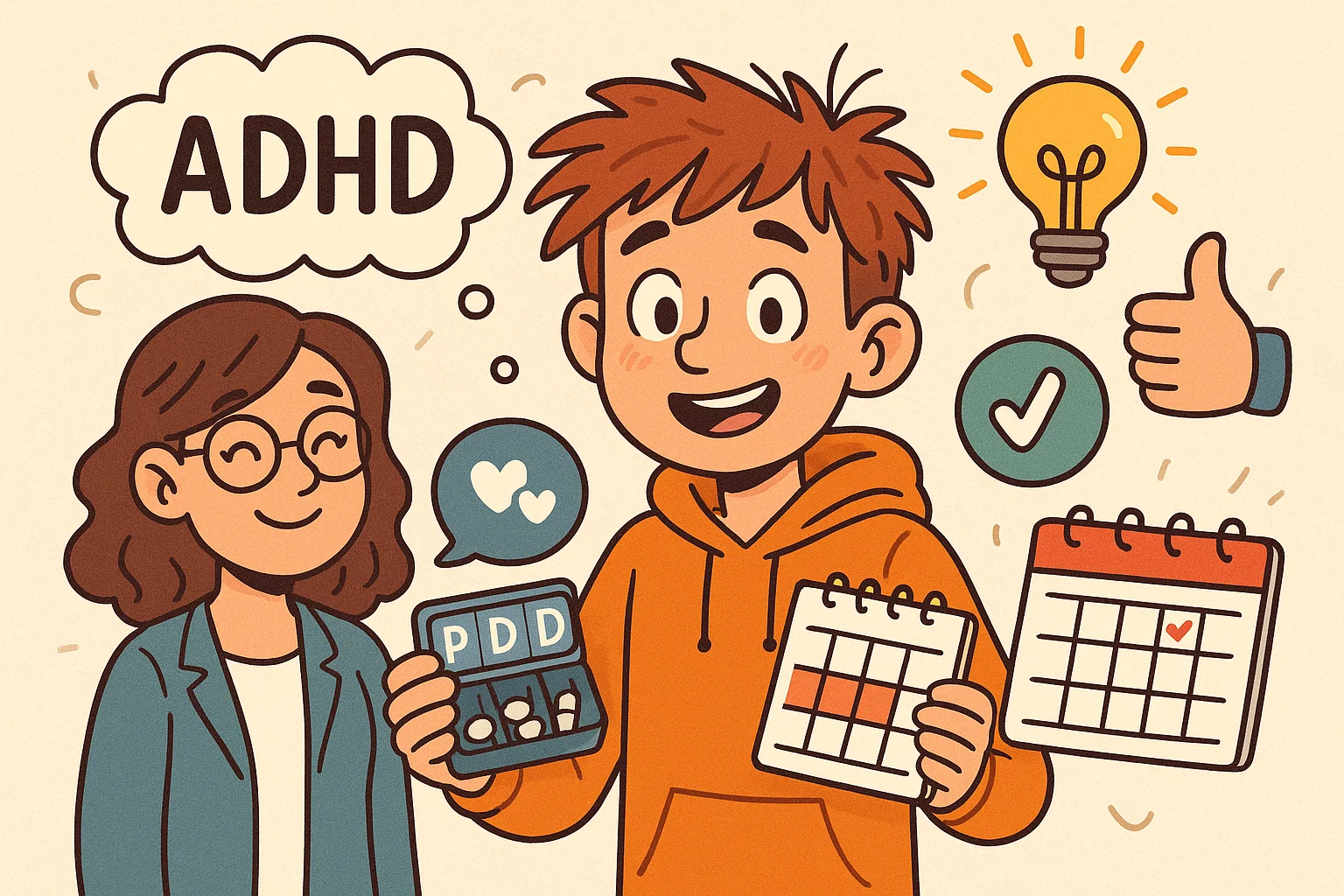Parenting Tips for Teens with ADHD

Raising a teenager presents unique challenges under any circumstances, but when your child has ADHD, the adolescent years can feel particularly overwhelming. The combination of hormonal changes, increased academic pressure, and social complexities can amplify ADHD symptoms, creating a perfect storm of impulsivity, emotional volatility, and resistance to authority.
This comprehensive guide offers evidence-based strategies to help you navigate the complexities of parenting a teenager with ADHD, from managing daily challenges to strengthening your relationship and knowing when professional intervention might be necessary.
Key Challenges When Raising a Teen with ADHD

Teenagers with ADHD face a unique set of obstacles that can make typical adolescent development more complicated. Unlike neurotypical teens, those with ADHD may struggle with executive functioning skills that are crucial for independence, such as time management, organization, and impulse control.
The prefrontal cortex, responsible for decision-making and self-regulation, doesn’t fully mature until the mid-twenties. For teens with ADHD, this developmental delay can be even more pronounced, leading to behaviors that might seem immature or defiant but actually reflect neurological differences.
| Common ADHD Teen Challenges | Typical Manifestations |
| Executive Function Deficits | Poor time management, forgotten assignments, messy rooms |
| Emotional Dysregulation | Intense reactions, mood swings, difficulty calming down |
| Social Difficulties | Trouble reading social cues, impulsive comments, peer conflicts |
| Academic Struggles | Procrastination, incomplete work, test anxiety |
Emotional Instability and Conflict
Emotional regulation presents one of the most significant challenges for teens with ADHD. Your teenager might experience intense emotions that seem disproportionate to the situation, leading to frequent conflicts and misunderstandings. These emotional outbursts are not intentional misbehavior, but rather reflect how the brain processes and responds to stimuli.
When your teen experiences an emotional meltdown, remember that their nervous system may be overwhelmed. Dr. Russell Barkley, a leading ADHD researcher, notes that teens with ADHD may show a 30% delay in the development of executive functions—such as self-regulation and emotional control—compared to neurotypical peers. This means that a 16-year-old with ADHD might demonstrate self-regulation skills similar to those of an 11-year-old. [source]
To support your teen during emotional crises, try the “validate first, problem-solve later” approach. Acknowledge their feelings before offering solutions: “I can see you’re really frustrated about this assignment. That sounds overwhelming.” This validation doesn’t mean you agree with inappropriate behavior, but it shows you understand their internal experience.
Resistance to Authority and Rules 🚫
The teenage brain naturally questions authority as part of normal development, but ADHD can intensify this resistance. Your teen might challenge rules not out of deliberate defiance, but because their impulsive nature makes it difficult to pause and consider consequences before acting.
Adolescents with ADHD respond better to collaborative rule-making than to top-down mandates. Consider involving your teenager in establishing household rules and consequences. When they feel they have a voice in the process, compliance typically improves significantly.
Creating Structure and Setting Boundaries

Structure provides the external framework that many teens with ADHD lack internally. While your teenager might resist structure, claiming they want complete freedom, their ADHD brain actually craves predictability and clear expectations. The key lies in presenting structure as support rather than control.
Think of structure as scaffolding—gradually shifting from external to internal supports as skills develop. As they develop these capabilities, you can gradually reduce external supports while maintaining core boundaries around safety and respect.
Building Effective Routines
Successful routines for teens with ADHD balance consistency with flexibility. Unlike rigid schedules, effective routines focus on sequences of activities rather than specific times. For example, “homework before screen time” works better than “homework from 4-6 PM.”
Morning routines deserve special attention since they set the tone for the entire day. Work with your teen to identify the essential tasks: personal hygiene, medication, breakfast, and gathering school materials. Consider using visual reminders like checklists or phone apps rather than verbal nagging.
Evening routines should include wind-down activities that help transition from the day’s stimulation to rest. This might involve putting devices away an hour before bed, reviewing the next day’s schedule, or engaging in calming activities like reading or listening to music.
Sample ADHD-Friendly Evening Routine:
- Set out clothes and school materials
- Review tomorrow’s schedule
- Take medication if prescribed
- Engage in calming activity (reading, music, journaling)
- Devices off 30-60 minutes before sleep
Consistent Rules and Logical Consequences
Effective rules for teens with ADHD should be specific, reasonable, and directly connected to natural consequences. Vague rules like “be responsible” don’t provide enough guidance, while overly detailed rules can feel overwhelming and controlling.
Focus on rules that address safety, respect, and responsibility. Safety rules are non-negotiable (wearing seatbelts, no substance use), while other rules might have more flexibility based on your teen’s developing maturity and judgment.
Supporting Emotional and Mental Health
Teens with ADHD are at higher risk for developing secondary mental health conditions, including anxiety, depression, and low self-esteem. These challenges often stem from years of academic struggles, social difficulties, and feeling “different” from their peers.
Creating an emotionally supportive environment requires intentional effort to counteract the negative messaging your teen may have internalized. Focus on their strengths and celebrate progress, even small victories. Remember that building self-esteem is a gradual process that requires consistency and patience.
Active Listening and Emotional Validation
Active listening goes beyond simply hearing words—it involves understanding the emotions and needs behind your teen’s communication. Many parents of teens with ADHD fall into the trap of immediately jumping to problem-solving mode, but teens often need emotional validation before they’re ready to work on solutions.
Practice reflective listening by paraphrasing what you hear: “It sounds like you’re saying that math class feels overwhelming because the teacher moves too fast.” This approach shows you’re trying to understand their perspective rather than judge or fix immediately.
Avoid these common validation mistakes:
- Minimizing experiences with “everyone struggles with that”
- Dismissing emotions with “you’re being too sensitive”
- Immediately offering solutions before acknowledging feelings
- Comparing their struggles to others or your own experiences
While you might intend to be reassuring, these responses can make your teen feel unheard and misunderstood. Instead, acknowledge their experience first, then explore solutions together when they’re ready.
Stress Reduction Strategies
Teaching your teen effective stress management techniques provides them with lifelong tools for managing ADHD symptoms and emotional regulation. The key is finding strategies that appeal to your specific teenager’s interests and temperament.
Physical activity often provides excellent stress relief for teens with ADHD. Exercise increases dopamine and norepinephrine levels, neurotransmitters that are often deficient in ADHD brains. This doesn’t mean your teen needs to join organized sports—dancing, hiking, skateboarding, or even vigorous cleaning can provide similar benefits.
According to clinical observations and pilot studies, mindfulness and structured breathing exercises may support better emotional regulation and attentional control in teens with ADHD, although further research is still needed to confirm long-term efficacy. Start with short, simple exercises like the “4-7-8” breathing technique: inhale for 4 counts, hold for 7, exhale for 8. Even two minutes of focused breathing can help reset an overwhelmed nervous system.
Additional stress management options to explore:
- Creative outlets like art, music, or writing
- Time in nature or gardening activities
- Progressive muscle relaxation techniques
- Journaling or voice recording thoughts and feelings
Remember that what works for one teen might not work for another. Encourage your teenager to experiment with different approaches and pay attention to what genuinely helps them feel calmer and more centered.
Encouraging Academic Engagement 📚

Academic challenges often create the most stress for families dealing with teen ADHD. The increased demands of high school—longer assignments, multiple teachers, complex projects—can overwhelm teens who are already struggling with organization and attention issues.
The goal isn’t to eliminate all academic struggles but to help your teen develop strategies and self-advocacy skills that will serve them throughout life. This requires shifting focus from grades to learning processes and building resilience in the face of setbacks.
Coordinating with School
Effective school support requires ongoing communication between parents, teens, and educators. Many teens with ADHD qualify for accommodations under Section 504 plans or Individualized Education Programs (IEPs), which can provide crucial support like extended time on tests, preferential seating, or modified assignments.
However, accommodations work best when your teen understands and advocates for their needs. Encourage your teenager to communicate directly with teachers about their challenges and preferred learning strategies. This builds self-advocacy skills they’ll need in college and beyond.
Regular check-ins with teachers can help identify problems before they become crises. Consider establishing a weekly email update system or using online gradebooks to monitor your teen’s progress without being intrusive.
Creating Focused Study Habits
Traditional study advice often doesn’t work for teens with ADHD. Long study sessions, quiet environments, and sitting still might actually hinder rather than help their learning. Instead, work with your teen to identify their optimal learning conditions.
Many teens with ADHD benefit from:
- Study breaks every 15-20 minutes
- Background music or white noise
- Standing or movement while studying
- Color-coding and visual organization systems
- Breaking large assignments into smaller chunks
Help your teen experiment with different study techniques to find what works best for them. Some might prefer studying with a friend, while others need complete solitude. Some focus better in the morning, while others are night owls.
Building Independence and Responsibility

The transition to independence can be particularly challenging for teens with ADHD, who might lag behind their peers in developing executive functioning skills. However, with appropriate support and gradual skill-building, they can develop the capabilities they need for successful adulthood.
The key is providing just enough support to prevent failure while allowing room for learning from natural consequences. This delicate balance requires ongoing adjustment as your teen develops new skills and demonstrates increased responsibility.
Developing Life Skills Gradually
Life skills instruction for teens with ADHD often needs to be more explicit and systematic than for neurotypical teens. Skills that might seem obvious—like planning meals, managing money, or maintaining personal hygiene—may require direct teaching and practice.
Start with basic skills and gradually increase complexity. For example, begin with managing a small weekly allowance before moving to part-time job income. Practice cooking simple meals before moving on to more complex meal planning or assisting with family dinners.
Essential life skills to develop progressively:
- Personal care routines and hygiene management
- Basic cooking and meal planning
- Money management and budgeting
- Time management and scheduling
- Laundry and household maintenance
Create opportunities for your teen to practice these skills in low-stakes situations. Let them handle their own scheduling conflicts, manage their own homework deadlines, and experience the natural consequences of their choices when it’s safe to do so. This approach builds confidence while teaching valuable lessons about cause and effect.
Involving Teens in Decision-Making
Teens with ADHD often feel that life happens to them rather than feeling empowered to make choices. Involving them in family decision-making helps develop critical thinking skills and increases their investment in following through on agreements.
This doesn’t mean your teen gets equal voting power in all family decisions, but their input should be valued and considered. Include them in discussions about family rules, vacation planning, major purchases that affect them, and their own treatment decisions when age-appropriate.
When your teen disagrees with your decisions, take time to understand their perspective before explaining your reasoning. This models respectful communication and helps them feel heard, even when they don’t get their way. Consider asking questions like:
- “What concerns you most about this decision?”
- “How do you think this might affect you?”
- “What alternative would you suggest?”
- “What information do you think I should consider?”
This collaborative approach teaches your teen that their opinions matter while helping them understand the complexity of decision-making processes they’ll need to master as adults.
Medication and Behavioral Support 💊

Treatment for teen ADHD often involves a combination of medication, behavioral interventions, and lifestyle modifications. The goal is to provide comprehensive support that addresses both symptoms and skill development.
While medication can be highly effective for managing core ADHD symptoms, it’s not a cure-all. Teens also need to develop coping strategies, organizational skills, and emotional regulation techniques that will serve them throughout life.
Monitoring Medication and Side Effects
If your teen takes ADHD medication, regular monitoring is essential to ensure effectiveness and identify any side effects. Adolescence brings physical changes that can affect how medications work, requiring periodic adjustments in dosage or timing.
Key side effects to monitor:
- Appetite suppression and weight changes
- Sleep difficulties or insomnia
- Mood changes or increased irritability
- Growth concerns or delayed development
- Headaches or stomach upset
Keep a simple log tracking your teen’s mood, appetite, sleep, and symptom management to share with your doctor during appointments. This documentation helps healthcare providers make informed decisions about treatment adjustments.
Your teenager should be involved in discussions about their medication, including decisions about dosage changes or trying new medications. This builds self-advocacy skills and helps them understand their treatment plan. Encourage them to communicate directly with their doctor about how they feel the medicine is working and any concerns they might have.
Behavioral Therapy Options
Behavioral interventions, particularly Cognitive Behavioral Therapy (CBT), have been shown to help teens with ADHD improve organizational skills and manage negative thought patterns. While these approaches do not eliminate ADHD symptoms entirely, studies suggest they can significantly reduce emotional reactivity and support daily functioning. [source]
Family therapy can also be beneficial, helping improve communication patterns and reducing conflict. Many families find that ADHD coaching provides practical, skill-based support that bridges the gap between therapy and everyday life management.
Types of behavioral support to consider:
- Individual CBT for ADHD-specific skill building
- Group therapy for peer support and social skills
- Family therapy for communication improvement
- ADHD coaching for practical life management
- Social skills training for peer relationship challenges
When to Seek Professional Help 🚨
While many ADHD-related challenges can be managed with family support and school accommodations, some situations require professional intervention. Recognizing when your family needs additional help is crucial for preventing more serious problems from developing.
Trust your instincts as a parent—if you feel overwhelmed or notice concerning changes in your teen’s behavior, mood, or functioning, don’t hesitate to seek professional guidance. Early intervention is almost always more effective than waiting until problems become severe.
Warning Signs Not to Ignore
Certain behaviors and symptoms warrant immediate professional attention, as they may indicate additional mental health conditions or safety concerns. These warning signs include:
- Persistent sadness or hopelessness lasting more than two weeks
- Talk of self-harm or suicide
- Significant changes in appetite, sleep, or energy levels
- Withdrawal from friends and activities they previously enjoyed
- Aggressive behavior toward others or property destruction
- Substance use or risky sexual behavior
- Dramatic decline in academic performance or school refusal
Additionally, if your current treatment plan isn’t working after several months of consistent implementation, professional evaluation can help identify what adjustments might be needed.
Available Professional Resources
Different types of professionals offer various forms of support for teens with ADHD and their families. Understanding these options can help you choose the most appropriate resources for your specific situation.
Psychiatrists specialize in medication management and can diagnose co-occurring conditions like anxiety or depression. Psychologists and licensed therapists provide counseling and behavioral interventions. ADHD coaches focus on practical skill-building and organization strategies.
When selecting a professional, look for experience working specifically with adolescents and ADHD. Ask about their treatment approach and how they involve teens and families in the process.
Navigating ADHD Parenting: Key Concerns Addressed
What if my teen refuses to follow any rules?
Set clear, consistent expectations and follow through with appropriate consequences. Avoid escalating conflict; instead, calmly reinforce limits and acknowledge positive efforts.
How can I tell if it’s typical teen behavior or ADHD-related?
ADHD behaviors are more frequent, intense, and interfere more significantly with daily functioning. Look for patterns like persistent impulsivity, disorganization, or difficulty with emotional regulation.
Is medication absolutely necessary?
Not always. While many teens benefit from ADHD medication, behavioral therapy, coaching, and environmental accommodations can also be effective. Discuss options with a licensed clinician.
What should I do during emotional meltdowns?
Stay calm, offer space, and use co-regulation techniques like deep breathing or grounding. Avoid punitive responses in the heat of the moment; problem-solve afterward.
How do I motivate my teen to be more responsible?
Use short-term rewards, build routines, and break tasks into manageable steps. Celebrate small wins and avoid criticism-heavy communication.

